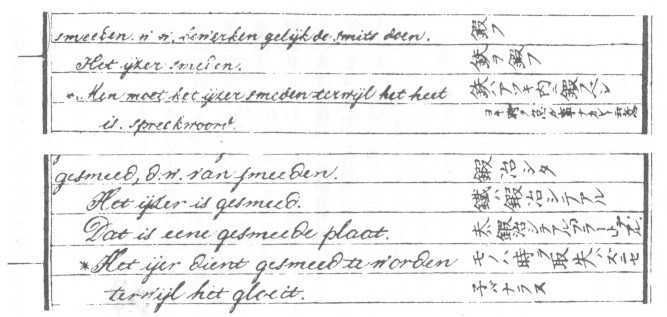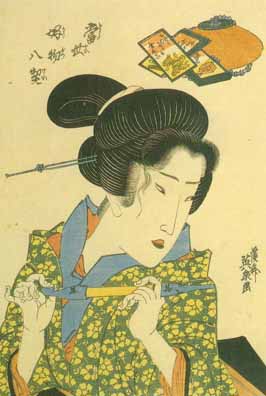
Abstracts in English

(『ことわざ(KOTOWAZA)』vol.2、Dec.2002)
Top Iroha Karuta is a sort of card game utilizing proverbs. It is very popular in Japan and quite unique in the world. Iroha means 48 characters in the Japanese language, like ABC in English, and Karuta, a word of Portuguese origin, means playing cards in traditional Japanese style.
Iroha Karuta is a sort of card game utilizing proverbs. It is very popular in Japan and quite unique in the world. Iroha means 48 characters in the Japanese language, like ABC in English, and Karuta, a word of Portuguese origin, means playing cards in traditional Japanese style.A set of Iroha Karuta consists of 96 rectangular cards. Half of the set is called Jifuda or Yomifuda (cards for calling), on each of which a proverb is printed. Since the head characters of these proverbs are different from each other, Jifuda contains 48 different proverbs. The other half is called Efuda or Torifuda (illustrated cards for touching), on each of which a picture corresponding to the proverb with a head character is printed.
In the New Year vacation, everywhere in Japan children gather at their friend's home and often play Iroha Karuta. One of the children calls Jifuda loudly one after another at random and the rest of them try to take colorful Efuda corresponding to the former. When a proverb is called, he/she who touches the matched illustrated card first gains it. When no cards remain, the game is over, and he/she who gains the most cards wins. Its rule is so simple that even children before school age can take part in the game. If they don't know characters, the pictures help them to assume what characters they are. Though children do not understand the meaning of proverbs completely, they soon memorize all the proverbs with their illustrations while they play the game repeatedly. Through playing Iroha Karuta most of children in Japan unconsciously learn not only the characters but the wisdom of everyday life expressed in proverbs.
It seems that Iroha Karuta was invented by anonymous tradesmen and craftsmen in Kamigata (Kansai area) around the beginning of the 19th century under the Tokugawa regime. It won immediate popularity among children at that time, and spread into Edo (Kanto area) before long where the Edo version developed. From the end of the Tokugawa regime the latter had gradually spread all over Japan and it became one of the most popular games among children in the late Meiji era.
"Meiji Iroha Karuta", reprinted here by The Japan Society for Proverb Studies, is a typical version in the Meiji era. Its texts and pictures are basically quite traditional, but some of them reflected the fashion of modern civilization. For example, in the Efuda of ゑ a man does not wear a topknot as in the Efuda of れ. Originally it consisted of two sheets (in the present reprint both of them are printed on the same sheet); one is Jifuda and the other is Efuda. Children bought the pair and if the sheets were too thin to play, pasted them to another sheet of paper, then cut them into rectangular cards.
Below are the proverbs contained in Meiji Iroha Karuta. In each item the first character in Japanese is the head character of the proverb, they are arranged according to Iroha(alphabetical) order. Next is the Romanized original and its literal translation, and last a near equivalent proverb in English is given (but in some cases no equivalent can be found).
い Inu mo arukeba, bo ni ataru. (Even a dog, if it walks round, will clash with a stick.) The flying crow always catches something./The dog that trots about finds a bone.
ろ Ron yori shoko. (Proof is stronger than argument.) A single fact is worth a shipload of arguments.
は Hana yori dango. (Better dumplings than cherry blossoms.) Bread is better than the song of birds.
に Nikumarekko yo ni habakaru. (Bad boys stalk through the world.) The more knave, the better luck.
ほ Honeori-zon no kutabire-moke. (To labour hard for nothing but to gain fatigue.) So much labour came to naught.
へ He o hitte shiri tsubome. (To try to close the anus after breaking wind.) It is too late to cast anchor when the ship is on the rocks.
と Toshiyori no hiyamizu. (Old men drink cold water 〔to show courage.〕) The spirit willing, but the flesh is weak.
ち Chiri mo tsumotte yama to naru. (Dust, when accumulated, makes a mountain.) Many a pickle makes a mickle.
り Richigi mono no kodakusan. (Honest and hardworking men have many children.)
ぬ Nusubito no hirune. (A robber naps in the daytime〔to serve his own secret purpose.〕) Everyone is witty for his own purpose.
る Ruri mo hari mo teraseba hikaru. (Crystals as well as lapiz lazuli will sparkle when light is beamed upon them.)
を Oitewa ko ni shitagae. (When old, obey your children.)
わ Warenabe ni tojibuta. (A mended lid to a cracked pan.) Every Jack has his own Jill.
か Kattai no kasa urami. (Even the leper envies the syphilitic.) Every man thinks his own burden the heaviest.
よ Yoshi no zui kara ten o nozoku. (To look at the heaven through a reed tube.)
た Tabi wa michizure, yo wa nasake. (Companions in a journey, compassion in a society.) Good company makes the road shorter.
れ Ryoyaku wa kuchi ni nigashi. (A good medicine is bitter in the mouth.) Advice is seldom welcome.
そ Soryo no jinroku. (The eldest son is a dunce.) First born, least clever.
つ Tsukiyo ni kama o nukareru. (The cauldron was stolen in the moonlight night.) Danger comes soonest when it is despised.
ね Nen niwa nen o ire. (Be careful, and yet more careful.) Measure thrice before you cut once.
な Naki tsura o hachi ga sasu. (A wasp stings the weeping face.) Misfortunes seldom come alone.
ら Raku areba ku aru. (After pleasure comes pain.) Life is not all beer and skittles.
む Muri ga toreba, dori hikkomu. (When force pushes on, reason draws back.) Where might is master, justice is servant.
う Uso kara deta makoto.(A lie which happened to come true.) Many a true word is spoken in jest.
ゐ Imo no nieta mo gozonji nai. (He cannot judge whether the potatoes have got boiled.)
の Nodomoto sugureba atsusa wasururu. (After hot food has passed through the throat, one forgets the heat.) Danger past, God forgotten.
お Oni ni kanabo. (An iron rod to a devil.) Hercules with the distaff.
く Kusai mono ni futa o shiro. (Put a cover over a stinking thing.)
や Yasumono kai no zeni ushinai. (He who buys cheap loses his money.) Cheapest is dearest.
ま Makeru wa kachi. (To lose is to gain.) Better bend than break.
け Gei wa mi o tasukeru. (Art helps one's life.)
ふ Fumi wa yaritashi, kaku te wa motazu.(Wishing to send a letter, she has no hand to write it.)
こ Ko wa sangai no kubikase. (A child is the neck-shackle to its parents throughout the three worlds.) Children suck the mother when they are young, and the father when they are old.
え Ete ni ho o ageru. (To sail before the wind.) Hoist your sail when the wind is fair.
て Teishu no sukina aka-eboshi. (Let the husband have his favorite red eboshi.)
あ Atama kakushite shiri kakusazu. (To hide the head and leave the hips uncovered.)
さ Samben mawatte tabako ni sho. (Let us go round three times and have a smoke.)
き Kiite gokuraku, mite jigoku. (Paradise on hearsay, hell at sight.) Common fame is a liar.
ゆ Yudan taiteki. (Carelessness is a great enemy.) Danger is next neighbour to security.
め Me no ue no kobu. (A wen over one's eye.)
み Mi kara deta sabi. (The rust grown out of the blade.) As you sow, so you reap.
し Shiranu ga hotoke. (He is like Buddha while he knows nothing.) What the eye sees not, the heart craves not.
ゑ En wa ina mono aji na mono. (Matches are made mysteriously by chance.) Marriages are made in heaven.
ひ Bimbo hima nashi. (Poverty has no leisure.)
も Monzen no kozo narawanu kyo yomu. (A boy living near a Buddhist temple recites an untaught sutra.) The saint's maid quotes Latin.
せ Se ni hara wa kaerarenu. (The belly cannot be replaced by the back.) Near is my shirt, but nearer is my skin.
す Sui ga mi o kuu. (Gay life ruins one's fortune.)
京 Kyo no yume, Osaka no yume. (The dream of Kyoto, the dream of Osaka.)
(『明治いろはかるた』解説、遊戯社、1996)
Top
(『ことわざ(KOTOWAZA)』vol.1、Nov.2001)The Rise and the Decline of Tatoe Karuta
 Tatoe Karuta is the forerunner of Iroha Karuta, the traditional Japanese playing cards utilizing proverbs. Tatoe means proverb(s) in this case, and Karuta, a word of Portugese origin, means playing cards. Though some researchers have compared the rare remaining ones with Iroha Karuta, there still remain many unsolved questions about Tatoe Karuta. For example, "when did it appear and disappear?" "how did they play it?" and so on. Here, I will research these questions in the fields of arts and literature.
Tatoe Karuta is the forerunner of Iroha Karuta, the traditional Japanese playing cards utilizing proverbs. Tatoe means proverb(s) in this case, and Karuta, a word of Portugese origin, means playing cards. Though some researchers have compared the rare remaining ones with Iroha Karuta, there still remain many unsolved questions about Tatoe Karuta. For example, "when did it appear and disappear?" "how did they play it?" and so on. Here, I will research these questions in the fields of arts and literature.
I have found Tatoe Karuta in an Eisen's Ukiyo-e printed in c.1823, which is usually called "Karuta" or "Iroha Karuta". I noticed the Karuta at the top right corner of this print and judged that it is none other than Tatoe Karuta, since both the illustration of a proverb and its text are depicted in each Karuta card. Usually, in the case of Iroha Karuta, an illustration and a title character, not the whole text, of a proverb is depicted. The print belongs to the series of "Tosei Kobutsu Hakkei"(Eight Contemporary Beauties with their Favorite Things). In fact, in other prints of the same series, such fashionable items as a samisen and a program of Kabuki are depicted beside the attractive ladies. Therefore, I suppose, Tatoe Karuta was one of the fashions at that time.
On the other hand, seeking literary works in which Tatoe Karuta appears, I encountered Tanehiko's "Keisei Seisuiki"(1821). In this short novel, Genta(the hero), Umegae(the heroine), and others played it at a pleasure quarter. Through the descriptions and illustrations in the novel, we can understand how to play it, as well as the atmosphere surrounding the game.
Considering other materials besides the above-mentioned two, I draw the following conclusion:
(Bulletin of the Language Institute of Gakushuin University, No.22,1998)The Logic of Proverbs as a Whole
When I read the translations of foreign literature, I sometimes find inadequate translations regarding proverbs. Probably these misunderstandings have been caused mainly by the following two unconscious preoccupations imbibed during foreign language education in Japan.
In order to understand foreign proverbs adequately, it is necessary for us to liberate ourselves from these preoccupations, and to research the logic of proverbs. In this short study I mention some characteristics of proverbs as a whole for further research besides the logic within proverbs.
(In other words, interpretation of each word should certainly lead to an understanding of a proverb.)
In conclusion, I think proverbs exhibit a sensitive and intuitive wisdom, in contrast to the authoritative knowledge and philosophy of social ideologies and religions.